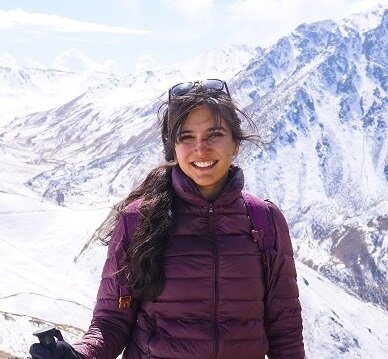Why Community-Based Tourism & Responsible Tourism Starts With You?
/We’re constantly encouraged to travel and see things to appear “worldly” and “cultured” - it has become a thing for young 20-somethings and even 30-somethings to take all your belongings and travel as cheaply as possible.
That’s what I did, and that’s how I started, but recently I have had a tiff with how some people have chosen to go about it, and this is why I have decided to pen a post on why responsible and community-based tourism should be advocated for and start with you, me and all of us.
You hear stories of California Poppies being destroyed in a “super bloom” all in the name of doing it #forthegram - that’s even a hashtag for this by 204,000 people and an account that shames people for abusing public lands called @PublicLandsHateYou. We live in an age where if you want to find a picture of anything scenic, famous or historic, we can just look it up on Google and Instagram. 20 years ago, that was not possible - you either had to find a place that had a picture or go there yourself if you wanted to see it.
But in the Insta-cool age, if you take a picture of just something (nature, art piece, view points) it does not stand out from the vast number of the ones you find online. So to make it unique, you take a picture with yourself in it as living proof and destroy the nature in the process. I can’t help but cringe at this insensitive behaviour. I don’t want to sound preachy about this, and am not here to tell you what to do, just wanted to share a few thought-starters.
How do we go about in bringing this change? Are we in for escapist thrills? Or do we take a step further to recognise nature as creatures like ourselves?
What is Responsible Tourism & Community-Based Tourism And Why It Matters?
In a nutshell, responsible tourism is tourism that minimises the negative impact on our environment - socially and economically while granting greater benefits to local communities. It is often used interchangeably with eco-tourism, sustainable tourism, ethical travel and impact travel. The definitions are countless.
On the other hand, community-based tourism involves the local people, the grassroots whose income depends on generating authentic experiences not at the expense of misusing the land and the nature around us. It is people-valued tourism over profits that gives locals a voice and involves them in the greater good of transforming experiences and keeping sustainability as the focal point.
With tourism being a billion-dollar industry: these two types of tourism are important in educating and inspiring tourists, not just travellers to be mindful of the communities and projects that are happening across the world.
It is frustrating when tourism campaigns only focus on the good and surface-level vanity consumerism experiences but ignore the diversity of destinations which can be better optimised to tackle the country’s inequalities.
Selfie-stick and umbrella-wielding tourists from and to Asia are on the move - do we need them for touch-and-go experiences or used tourism dollars to bring awareness to their senses while they’re on a holiday? Perhaps these are the questions that we should ask.
Why Netflix ‘Our Planet’ Is A Reminder To Exercise Our Consciousness
Netflix ‘Our Planet’ is a good reminder of the wonders of nature and how humans can destroy it in the process.
We probably have not thought about it - but have you ever wondered what would happen if the earth gets 2 degrees warmer? Starting from a travel-perspective, nobody would ever think of taking Mediterranean holidays. People would think twice before moving to the coast.
It’ll be worse for people living close to the equator (case in point: Malaysia, where I stay in). Within 40 years, the hot European summer recently where I went in Europe while cycling along the Danube will be the norm. The heatwave won’t be ordinary, it will probably be called a heatwave of Saharan intensity.
Watching the recent Netflix ‘Our Planet’ was alarming and hit a trigger point on how nature’s habitat gets wiped out as orangutans are no longer able to see as far as the horizon because trees have been replaced by palm oil plantations.
On the other end, it shows the impact of melting Arctic sea ice on the lives of walruses fighting for space off the coast of Russia. It was painful to watch walruses climb cliffs (something which they’re not suppose to) as there is no ice for them to rest on, and they die a painful death as they come tumbling down from these cliffs.
The controversial walrus falling off cliffs in Russia on Netflix Our Planet is a brutal reality.
It got me thinking about human consciousness and how important it is to observe our surroundings carefully and take note of what is happening. Nature can tell us things about ourselves and more importantly, about how we can approach it.
We constantly abuse our planet and take what we want because we experience ourselves as distinctly separate individuals. Given this conditioning, we don’t treat our tables, mattresses, animals and the things we consume on the same level. But once we start seeing that there’s life in it, and we’re conscious of the things around it - we won’t take it for granted.
We have freewill to do a lot of things on this planet being the intelligent species of the lot, and it would only make sense if we can exercise our consciousness to implement changes.
I implore you to read a book titled ‘The Overstory’ that takes the theme of connection with the natural world a step further, challenging people to recognise trees as creatures like themselves. It won the 2019 Pulitzer Prize and uses stories to humanise the subject of climate change rather than clinical concepts, which is what we need to fully grasp the reality of what’s happening to the world.
The Cool And Sustainable Ways To Travel Green
By just taking some personal steps, it may appear minuscule in the grand scheme of things, but they can raise our own consciousness about our earth’s scarce resources. In fact, by just discussing the issue with your friend and family is one of the most important and basic things you can do.
Here’s some of the cool and fun sustainable ways which I think can matter if you choose to travel green, and some tips to travel sustainably. When travelling, remember to only purchase sustainable travel products.
1. Bicycle Touring
Bicycle Touring in Laos countryside
I can’t think of a more conducive, interesting and carbon neutral way to see the world. With bicycle touring, you exchange miles for views, and meet communities that are often sped past, only to stop and hear them speak about how they’re making a living, bringing about a change in small ways. It’s inspiring, eventhough you’re physically annihilated sometimes but the rewards are countless.
Also Read: Cycling in India: On The Leh to Srinagar Highway
2. Buying Carbon Offsets
There’s a newer way to fund projects that you’re passionate about and all at the same time offsetting your carbon footprint. Basically, carbon offsets are a way for individuals and businesses to balance out their greenhouse gas emissions by allocating funds to emission reduction programs.
Some argue that it is unethical as offsets give people the impression that their consumption has no negative net effect on the environment and allows companies to gain green credentials and also feeds into the cycle that as long as you have money, you can continue finding ways to offset with money instead of exercising restraint. There are pro and cons to this: but the choice is ultimately yours. Companies like Native Energy and the Gold Standards Foundation are some examples where you can contribute to their projects for as little as $11.00.
3. Participating In More Community-Based Travel
Globalization has erased traditions and skills but not in Yazd, Iran’s mud-town.
It would be great if we could be selective with our travels and deliberately seek projects that fortify change and meaningfulness. If you go to the jungles of Bentong in Malaysia, you’ll find these homestays that have a very strong mindset towards not littering or even visiting an eco-village in Yazd, Iran’s mud-town. People are trained to be ecological, rather than technological. With cement causing damage to earth’s fertile layer, the topsoil, the houses in Yazd, showcases how building with mud mortar of sand and unbaked bricks is refashioned to live sustainably. Other community-based tourism projects include a walking tour in Dharavi, in central Mumbai where young adults are grown up in Dharavi and work as tour guides to fund their education and even volunteering in Cambodia.
Also Read: 10 Reasons Why I Travelled To Persia
4. Travel Less
It’s ironic for me to say this since I run a travel blog: but for what it is worth and neccessary, I think it is time we don’t travel for the sake of travel, rather travel only as long as it is well-intentioned and you’re doing your bit to consume less.
Zach from Passion Passport wrote this and I’ll just leave it here, “Places aren’t trophies that you put on a shelf; they aren’t likes for you to collect. And once you’ve stepped foot in a place, you don’t get to just move on to the next, viewing it as a checkpoint along a path of privilege. Places need to be appreciated, and our travels should be considered carefully with each iteration.”
If you connected with this story, tell me why in the comments below, and why you think we should exercise consciousness to be better citizens of the earth.
Like this story? PIN IT













